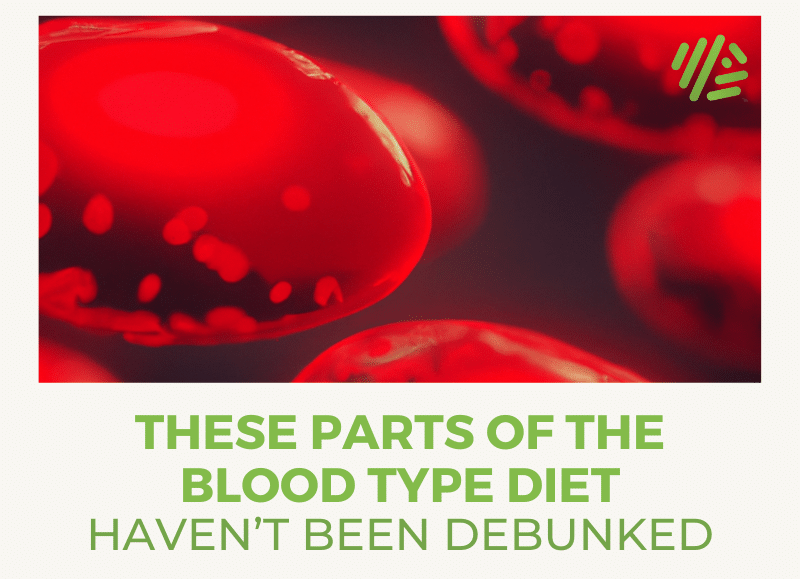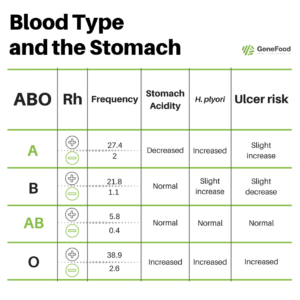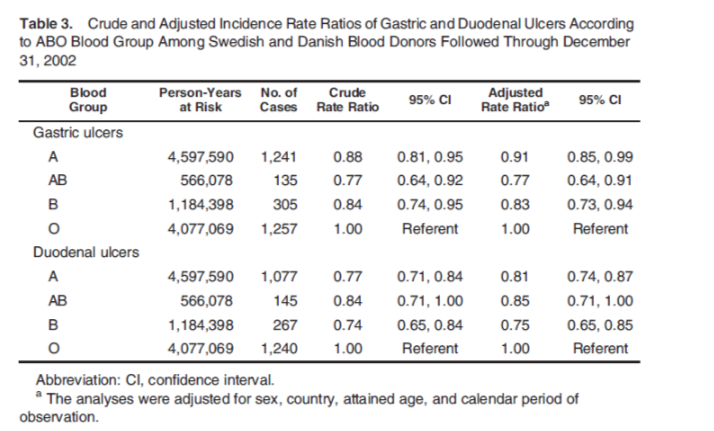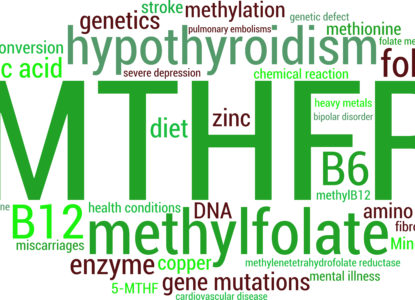Why The Blood Type Diet Still Has Some (Limited) Value
Article at a Glance
- The blood type diet has been largely debunked, however, the main science backed diet issue for people to consider based on their blood type is the level of hydrochloric acid produced in the stomach.
- Hydrochloric acid is essential for properly digesting food, especially animal protein, and there is good evidence demonstrating differences in hydrochloric acid levels based on people’s blood type, with O blood type having the highest levels.
- There is also a link between risk for certain types of ulcers and blood type.

Contents
We get questions about the blood type diet at Gene Food because the diet claims to be able to personalize nutrition based on blood type, and people sometimes confuse it with nutrigenomic diets.
If you’re wondering whether the blood type diet has been debunked, several studies have shown a lack of efficacy for people who follow the diet looking to improve health.
Yes, the blood type diet is largely thin on evidence, especially after a study by plant based doctor Neil Barnard showed changes in weight, fasting blood sugar and cholesterol didn’t have anything to do with blood type in a group placed on a low-fat vegan diet. Although, as I will discuss in this post, there are a few narrow redeeming qualities to this much maligned fad diet.
The D’Adamo Blood Type Diet Debunked
In the early 2000’s, diets based on your ABO blood type were all the rage, with the D’Adamo diet being one of the most popular versions. Scientific review of blood type diets
In 2013, a group of researchers studied blood type diets comprehensively. 1 After screening 1,415 studies, they identified 16 possible targets, which they further refined down to a single study of interest.2
The paper itself is quite difficult to follow so I’ll just take this quote from the authors:
None of the studies showed an association between ABO blood type diets and health-related outcomes.
Pretty conclusive stuff.
Follow-up study
This systematic review was followed up by a direct study investigating blood type diet and its impact on cardiometabolic risk factors in 1,455 individuals.3 Again the paper has a lot of detail and is perhaps again summed up best by the authors:
Our findings show that adherence to certain ‘Blood-Type’ diets is associated with a favorable profile for certain cardiometabolic risk factors in young adults, but these associations were not related to an individual’s ABO blood group.
My emphasis in bold. So, while a positive effect from following the low meat high fruit and vegetable diet was observed, this was not associated with any particular blood group. Rather, it is just an effect of following a traditional “healthy” diet. This study was considered the nail in the coffin of the blood type diet. Dr D’Adamo refutes this study on his site but once again, in a non peer review format.
Dr. Neil Barnard’s blood type diet study
Dr. Barnard’s recent study follows in the same vein as the 2013 analysis I discuss above. Dr. Barnard is a staunch advocate of plant based diets, and his blood type diet study shows no enhanced benefit for blood type A on a low-fat vegan diet vs. other blood types.
Most participants saw improvements, it’s just that no one group saw greater results for cholesterol, BMI, fasting blood sugar, HbA1c, or weight loss than another due to blood type. If the blood type diet had merit, the low fat vegan diet should have been well suited to type A blood types and not as well suited for those with type O blood, who under the rules of Dr. D’Adamo’s protocols would be healthier on a diet with more animal protein.
Based on the cardiometabolic markers studied, this turned out not to be the case, which may have put the final nail in the coffin for the blood type diet, at least within the scientific community.
The end of blood type and diet?
So is that the end? Are blood type and diet definitively not linked? Well in the sense that you should follow a particular diet based on your blood type, yes. In that respect, the blood type diet has been debunked.
However, there are some dietary risk factors which do seem to be associated with blood type, which can be influenced by certain dietary choices.
ABO Blood Classification
But before we look at that it’s worthwhile to go over the ABO blood classification as this can give us some idea where the initial blood type diet hypothesis came from, and how it might be relevant for other studies. The ABO blood system was first described at the start of the 20th century by the Austrian physician Karl Landsteiner who demonstrated that our red blood cells could carry one of two antigens (a protein which can cause immune cells to generate antibodies) on their surface; A or B or none at all. We now know that this expression is determined by our genetics, meaning each individual will have two types of antigen present, which are summarized in the table below.
| Blood Type | A | B | O |
| A | AA | AB | AO |
| B | BA | BB | BO |
| O | AO | BO | OO |
Diets for each blood type
O is Ancestral
The blood type diet was based around the idea that O is the ancestral blood group and so their optimal diet should match that of our early ancestors, being high in animal protein and low in grains, a version of the paleo diet.
A Vegetarian
A evolved next and so these individuals should benefit from a vegetarian diet as this was when we first settled into villages and began cultivating our food.
B can handle dairy
Finally, B was thought to be the last evolving group and so individuals are thought to deal well with dairy products.
AB Can handle variety
AB individuals are able to enjoy a wider diet type.
Lectins
Lectins, a type of small molecule in different foods said to the defense mechanism of plants to deter predators, were hypothesized to promote red blood cells to clump in a process called agglutination resulting in poor health outcomes. As discussed above, the science backing this is rather poor, however there is some emerging evidence about other dietary impacts.
Blood type, stomach acid and ulcers
As far back as the 1960s, researchers were describing an association between blood group, the secretion of hydrochloric acid in the gut and the associated development of ulcers.4 Proper levels of hydrochloric acid are vital as it promotes the digestion of food, maintains correct gut flora and optimizes the environment for digestive enzymes. 


How to lower ulcer risk
As we’ve discussed previously, H. pylori infection is commonly associated with the development of gastric ulcers, and several groups have demonstrated an association based on blood type; with A and O types thought to be at more risk although the exact mechanism linking the two remains unknown, and some studies are in disagreement.678 So if your blood type can predict gastric ulcer and cancer risk, and this seems to be driven by changes in susceptibility to H. pylori infection what can you do about it?
Potential dietary changes based on blood type
From a dietary perspective, high levels of fibre have been shown to be protective, other factors such as smoking, high alcohol intake and excessive red meat intake have also been associated with increased risk, although the relative effect is unclear. Therefore, the sort of mixed vegetable rich diet which is widely accepted as healthy should prove most beneficial to those with type O blood (but this type of diet is also beneficial in general).910
Those with blood type A secrete less hydrochloric acid into the gut and therefore may suffer from impaired digestion, particularly of protein rich and difficult to digest foods such as many red meats.11 This lack of digestion can limit the movement of food through the gut and promote bacterial colonization, especially from H. pylori.7However, no studies directly investigating type A associated lack of digestion with H. pylori overgrowth have been performed. See also: Probiotics aren’t the only way to restore gut health
Specific nutrients
The major nutrient or supplement to recommend is Saccharomyces boulardii which John has written an excellent post on. The section dealing with H. pylori is of obvious interest, with S. boulardii exerting a protective effect in association with antibiotics.12 Use of S. boulardii will likely be beneficial for those with both type A or type O blood who are at greater risk of H. pylori colonization.
Vitamin A intake has also been associated with a reduction in ulcer risk overall,9 vitamin C and E were also linked but the results were less clear. However, no studies investigating these nutrients in relation to blood type and ulcer risk have been performed. From a practical standpoint, those with an impaired ability to digest proteins due to a lack of stomach acid may benefit from experimenting with betaine HCL and digestive enzymes.
Take-home message
To summarize:
- The blood type diet has been largely discredited, although the healthy vegetable rich diet it proposes would likely be beneficial for most individuals.
- However, blood type can impact on the risk of developing gastric ulcers, with type O being the highest risk group.
- There are several general and specific dietary changes that can be made to reduce the risk of developing ulcers, but as of yet no studies linking everything together have been performed.




I haven’t yet read the Neil Bernard study. The problem with the studies I have read is that they really do not conform to D’Adamo’s recommendations. The PLOS study was quite frankly sloppy. The Journal of Nutrition study was was much improved but still has flaws. In particular the sources of meat were by no means lean, organic, or free-range. The omega-3 vs omega-6 profiles in free-range and wild-game animals is very different from that of conventionally farmed animals. I do acknowledge that the Journal of Nutrition study indicates that a diet with emphasis on plants appears beneficial for all blood-types. What isn’t clear to me is whether there would be any blood-type connection if “healthy” meats were used instead of the factory-farmed stuff in most grocery stores. It is disappointing that D’Adamo has not published or sponsored any peer-reviewed research to thoroughly back up his claims. I read that data he amassed for a promised study ended up being destroyed in an accidental fire, but it has been many years since then. Maybe researchers of the paleo diet could look at a blood-type connection?
I’ve been on the D’Adamo diet for about 1.5 years. A friend suggested I tried it as I tried everything and while in my early 50s, was simply not feeling well. As I tried vegetarian, and vegan lifestyles, I was gaining weight, becoming more bloated and felt literally terrible. It wasn’t much to change the diet, except adding meat back in. After a few years of eating no meat, my system quickly took to it. It took about a month of eating mostly highly beneficial foods with only a few neutral in there, I started to turn the corner. Now, I have more energy than ever, think better and even sleep better. There may be no scientific evidence, but I can say that after trying so many different eating combinations to simply feel better…not even to lose weight, I finally do.
Interestingly, the majority of “backed up” studies to debunk this EatRight4YourBloodType amazes me. And more, the researchers who had done the 2013 study were all healthy participants of a specific age group, and the researchers had only experimented with that study for one month versus decades of study based on Dr. Adamo’s research (he had provided his in-depth testimonials in some of his published books). Overall, once the body maintains its level to not react to foods that may be poisonous to the individual’s blood type (FYI – a healthy person), the individual can then eat whatever foods they needed at moderate levels.
Thanks for the comment Reese.
I have read Dr D’adamo’s books and applied his recommendations to my everyday life for about 3 weeks now. I feel so much better eliminating certain foods like the nightshade vegetables, red meat and dairy. Even more powerful was actual evidence from a personalized blood drawn food sensitivity analysis I had done several years previously. When reviewing the test result and the diet side by side it was about an 85% match. Meaning my personal digestive system was moderately sensitive to the same foods Dr D’Adamo recommends someone of my blood type avoid. There’s your science. And despite being a non fast food eater, no processed food household, I lost weight and feel more energized.
You contradicted yourself so many times in this article just by using logic. So you’re saying blood types have different acidic content in their bodies. That blood types are prone to diseases. And yet you can’t figure out how the different acids that digest our food wouldn’t have different effects on our bodies?
Sometimes in their quest to condemn scientists become blinded by their ego’s. Instead of conducting research to DISPROVE a theory, start to conduct your own research based on the chemistry alone.
Type A blood types have an elevated risk of pancreatic cancer for example.
Different acids in the blood types = different digestion issues and interactions with food. Food = health.
Just looking over this article fast I see some flaws in your assessment.
First you claim that the blood type diet was debunked based solely on a lack of cardiometric associations. Who ever claimed that cardiometrics were a metric of success? Could it be possible that any one of hundreds of other metrics could be positively associated with the blood type diet?
Also I saw the phrase ‘blood type diets’. What does this mean? Does it refer to the D’adamo diet?
Third, and I’ve seen this so many times on the webz, is the false claim that Blood type O should ‘eat a lot of meat’. Did you ever read D’adamo’s book(s). I did. The portions of meat, even for O, is very small, even in comparison to a SAD diet.
There are a lot of traps people fall into when supposedly debunking good information like D’adamo has presented. I doubt people were eating grass fed meats in the test samples, and probably a lot were eating processed meats.
Hi Bokus,
To answer your first question the systematic review found only the following paper worthy of inclusion based on their criteria:
https://www.ncbi.nlm.nih.gov/pubmed/9212175?dopt=Abstract
Which had a focus on serum LDL cholesterol as an output. While they didn’t include the other papers in their analysis they did make the following statement
“None of the studies showed an association between ABO blood type diets and health-related outcomes.”
and after reading the references it is possible to come to the same conclusion. I guess it is possible that there are metrics that are positively associated with blood type diets but these have never been shown. I know Dr D’Adamo has stated that trials for blood type diet were expected in 1998 and 2004, but these haven’t materialised.
2) There are several variations of blood type diets but yes Dr D’Adamo’s is the most famous and probably most widely followed. But the above statements apply to all such diets.
3) Taken from Dr D’Adamo’s material (with my emphasis):
“Hi Bokus,
To answer your first question the systematic review found only the following paper worthy of inclusion based on their criteria:
https://www.ncbi.nlm.nih.gov/pubmed/9212175?dopt=Abstract
Which had a focus on serum LDL cholesterol as an output. While they didn’t include the other papers in their analysis they did make the following statement
“None of the studies showed an association between ABO blood type diets and health-related outcomes.”
and after reading the references it is possible to come to the same conclusion. I guess it is possible that there are metrics that are positively associated with blood type diets but these have never been shown. I know Dr D’Adamo has stated that trials for blood type diet were expected in 1998 and 2004, but these haven’t materialised.
2) There are several variations of blood type diets but yes Dr D’Adamo’s is the most famous and probably most widely followed. But the above statements apply to all such diets.
3) Taken from Dr D’Adamo’s material (https://www.4yourtype.com/blood-type-o/ – my emphasis below):
“DIET PROFILE High Protein: Meat, Fish, Vegetables, Fruit, Limited Grains, Beans, Legumes
WEIGHT LOSS KEY: Avoid: Wheat, Corn, Lentils, Kidney Beans, Dairy Beneficial: Kelp, Seafood, Red meat, Kale, Spinach, Broccoli, Olive Oil”
Which is quite a strong push towards a paleo diet rich in meat, and yes I have read his books and online material.
4) As far as I’m aware Dr D’Adamo hasn’t presented any data, although I’m happy to be corrected about this.
Interesting, but I disagree that it’s a fad diet. It was marketed as such but the research it’s based on seems to be largely proprietary. It’s not indexed on pubmed or published anywhere. It’s empirical, and the only way of knowing what that research is to contact Dr. D’Adamo himself.
Avishek, I will let Aaron weigh in, but major journals, such as the American Journal of Clinical Nutrition, have done analysis of the diet and have found, at least comprehensively, it lacks evidence. See: Blood type diet lacks supporting evidence: a systematic review. Having said that, and as you can tell from my question for Aaron above, I am not necessarily a blood type diet “hater.” I think there are dietary implications for people based on their levels of hydrochloric acid, it’s just that the diet’s creators make larger claims than they can prove.
Thanks for your comment Avishek, as John said we’re not completely down on the influence of blood on dietary intake. From my reading of the published data (and that’s all I can base my posts on) I would say that the highly specific diet plans aren’t really based on any firm science, but there are some broad brush statements that can be made, such as those relating to pH or H. pylori infection.
Aaron, great post. As I read this, I can’t help but think there are potential, if not yet completely proven, health implications for the variations in stomach acid based on blood type.
For example, I’ve written recently about Candida, and how it needs a more alkaline PH to become pathogenic. It would seem based on your findings that those with type A blood, who have lower levels of hydrochloric acid, would be more prone to Candida, especially if they find themselves on a diet that is higher in animal protein?
Seems also that some of the issues I list in my post “Is a high protein diet making you sick?” Could be more relevant for type A, especially is they have urea cycle deficiencies, but based on our offline conversations, you’re sticking firm that these associations are as yet not established by credible science?
Thanks John. I think you’re definitely right that there are connections out there related to pH changes in the gut. The whole system is really quite sensitive and set up to work under optimal conditions so slight changes can really throw things out of balance. The problem is there are so many factors feeding into it (genetics, nutritional intake, gut microbiome and probably lots of other environmental factors as well) that it’s going to take a while to unravel.
I also think it will be a highly personal and likely fluctuate overtime as well, so what’s best for you now might change in a year or 10 years.
The candida and high protein issues are very relevant, and all the pieces of the story seem to be there, they’ve just not been all linked together yet… but we’ll keep an eye on the scientific literature and see what comes out.
What does ‘ph changes in the gut’ mean? A change in ph of stomach acid? A change in the small intestinal ph? A change in the cecum? a change in the colon?
What does that even mean?
How can you think you’re debunking anything with such nonsensical overarching statements?
Hi Bokus, I used gut as a catch-all term as although a lot of the changes in pH are measured in the stomach, the ulcers often form in different regions. For example the table in the post is looking specifically at duodenal ulcers.